|
Information
Service of
the Serbian Orthodox Church
November 26, 2004

REPORT
FROM THE CONFERENCE ON THE CONTRIBUTION OF THE CHURCHES TO RELIGIOUS,
CULTURAL AND INTER-NATIONAL COOPERATION ON THE PATH TO EUROPEAN
INTEGRATION
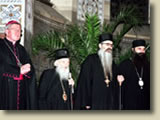 The
Conference on the Contribution of the Churches to Religious, Cultural
and Inter-National Cooperation on the Path to European Integration
with the motto “I give you my peace” spoken by Our Lord, took
place from November 22-24, 2004 in Subotica and Becej with the
organization of the Diocese of Backa of the Serbian Orthodox Church
and the Roman Catholic Bishopric of Subotica, with the support
of the Reform Christian Church, the Slovak Evangelical Church
and the Evangelical Christian Church. The
Conference on the Contribution of the Churches to Religious, Cultural
and Inter-National Cooperation on the Path to European Integration
with the motto “I give you my peace” spoken by Our Lord, took
place from November 22-24, 2004 in Subotica and Becej with the
organization of the Diocese of Backa of the Serbian Orthodox Church
and the Roman Catholic Bishopric of Subotica, with the support
of the Reform Christian Church, the Slovak Evangelical Church
and the Evangelical Christian Church.
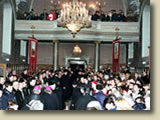 This
pan-Christian meeting began in Subotica with a formal Doxology
in the church of the Ascension of Our Lord served by His Grace
Bishop Irinej of Backa in honor of the visit of His Holiness Serbian
Patriarch Pavle to this northernmost Serbian city. The religious
service was attended by Roman Catholic Archbishop Stanislav Hocevar
of Belgrade and Bishop Ivan Penzes of Subotica; Bishops Istvan
Cete Semesi, Arpad Dolinski and Samuel Verbovski of the Reform
Churches; Republic of Serbia Ministers Milan Radulovic and Dr.
Bojan Dimitrijevic; ambassadors and members of the diplomatic
corps; as well as a large number of faithful of the Orthodox and
Roman Catholic Churches. After the Doxology, hundreds of faithful,
together with the participants of the Conference, led by the Patriarch,
the Archbishop and the other Bishops took part in a religious
procession to the nearby Franciscan monastery. Roman Catholic
Bishop Ivan Pezes conducted services in the monastery church. This
pan-Christian meeting began in Subotica with a formal Doxology
in the church of the Ascension of Our Lord served by His Grace
Bishop Irinej of Backa in honor of the visit of His Holiness Serbian
Patriarch Pavle to this northernmost Serbian city. The religious
service was attended by Roman Catholic Archbishop Stanislav Hocevar
of Belgrade and Bishop Ivan Penzes of Subotica; Bishops Istvan
Cete Semesi, Arpad Dolinski and Samuel Verbovski of the Reform
Churches; Republic of Serbia Ministers Milan Radulovic and Dr.
Bojan Dimitrijevic; ambassadors and members of the diplomatic
corps; as well as a large number of faithful of the Orthodox and
Roman Catholic Churches. After the Doxology, hundreds of faithful,
together with the participants of the Conference, led by the Patriarch,
the Archbishop and the other Bishops took part in a religious
procession to the nearby Franciscan monastery. Roman Catholic
Bishop Ivan Pezes conducted services in the monastery church.
 In
his welcoming remarks Bishop Pezes emphasized the upcoming talks
between sister churches and their representatives, the state,
local administration and international institutions. In
his welcoming remarks Bishop Pezes emphasized the upcoming talks
between sister churches and their representatives, the state,
local administration and international institutions.
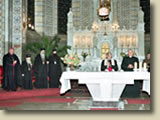 The
ceremony in the City Hall began with the anthem “God Grant Us
Justice” as Serbian Patriarch Pavle and Archbishop Stanislav Hocevar
stood at the honorary podium. Subotica mayor Geza Kucera welcomed
the participants in the gathering as people of goodwill who came
together in a city distinguished by its religious and national
tolerance. In his sermon at the conference opening Bishop Irinej
of Backa emphasized that this is the first pan-Christian gathering
of its kind, not only in Serbia and Montenegro but also in all
of Southeast Europe. The motto of this Conference is taken from
the Holy Scripture – The
ceremony in the City Hall began with the anthem “God Grant Us
Justice” as Serbian Patriarch Pavle and Archbishop Stanislav Hocevar
stood at the honorary podium. Subotica mayor Geza Kucera welcomed
the participants in the gathering as people of goodwill who came
together in a city distinguished by its religious and national
tolerance. In his sermon at the conference opening Bishop Irinej
of Backa emphasized that this is the first pan-Christian gathering
of its kind, not only in Serbia and Montenegro but also in all
of Southeast Europe. The motto of this Conference is taken from
the Holy Scripture – 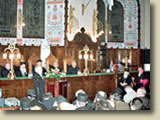 I
LEAVE YOU MY PEACE, I GIVE YOU MY PEACE. Bishop Irinej answered
the eventual question why peace is the key word when those of
us here live in peace – I GIVE YOU MY PEACE. Everyone talks about
peace and there is no peace. Peace is the fruit of the Holy Spirit
among us. Through it mutual love and willingness to build everything
that is good is revealed. Churches do not exist for their own
sake but for the world. Our contribution is true community between
individuals and peoples. Peace belongs to all those who are near
Christ, to those who are far from Christ, to those who believe
and to those who do not believe. He, who is the Creator of humanity,
is the primary and only peacemaker. All who follow His path build
peace. The task of cooperation is the essence of our life and
that is why true unification must have a corner stone, and that
is Christ Himself. This is not the first time Europe has been
unified. This unification can be repeated but not without spiritual
encouragement and inspiration. The Churches have this task and
goal. That is why we have chosen the message I GIVE YOU MY PEACE.
This message is necessary for us as pastors and faithful to witness
our internal resolve of heart and conscience, and to contribute
our unique peace among the Churches, the nations and the cultures.
By our love we will be recognized as belonging to Christ. I
LEAVE YOU MY PEACE, I GIVE YOU MY PEACE. Bishop Irinej answered
the eventual question why peace is the key word when those of
us here live in peace – I GIVE YOU MY PEACE. Everyone talks about
peace and there is no peace. Peace is the fruit of the Holy Spirit
among us. Through it mutual love and willingness to build everything
that is good is revealed. Churches do not exist for their own
sake but for the world. Our contribution is true community between
individuals and peoples. Peace belongs to all those who are near
Christ, to those who are far from Christ, to those who believe
and to those who do not believe. He, who is the Creator of humanity,
is the primary and only peacemaker. All who follow His path build
peace. The task of cooperation is the essence of our life and
that is why true unification must have a corner stone, and that
is Christ Himself. This is not the first time Europe has been
unified. This unification can be repeated but not without spiritual
encouragement and inspiration. The Churches have this task and
goal. That is why we have chosen the message I GIVE YOU MY PEACE.
This message is necessary for us as pastors and faithful to witness
our internal resolve of heart and conscience, and to contribute
our unique peace among the Churches, the nations and the cultures.
By our love we will be recognized as belonging to Christ.
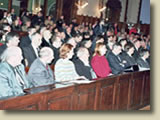 The
Conference was then also opened by Bishop Ivan Pezes, who emphasized
that “we are all aware of the value of peace and what a gift from
God to us all it is. Peace is specific, not by its content but
by its strength that can be established among people only if the
foundation of society is the principle that every person belongs
to God, that nature is bequeathed with reason and free will. From
human nature follow personal rights and wisdom, which are inseparable.
All people of every age have longed for peace on earth. Led by
Christ and His protection, let all people embrace like brothers
that peace may reign among them for all time.” The
Conference was then also opened by Bishop Ivan Pezes, who emphasized
that “we are all aware of the value of peace and what a gift from
God to us all it is. Peace is specific, not by its content but
by its strength that can be established among people only if the
foundation of society is the principle that every person belongs
to God, that nature is bequeathed with reason and free will. From
human nature follow personal rights and wisdom, which are inseparable.
All people of every age have longed for peace on earth. Led by
Christ and His protection, let all people embrace like brothers
that peace may reign among them for all time.”
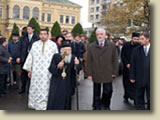 Those
present were then addressed by His Holiness Patriarch Pavle, who
said that true faith is not just in words, spoken and written,
but also in attitude and actions. Speaking about the role of the
Churches in religious, cultural and inter-national cooperation,
Patriarch Pavle said that only a person who respects the principles
of faith and truth fulfils the purpose of his or her existence.
He concluded his presentation with the words: “May the light of
your existence shine before all people. I wish you the peace,
justice and freedom so necessary to us all.” Those
present were then addressed by His Holiness Patriarch Pavle, who
said that true faith is not just in words, spoken and written,
but also in attitude and actions. Speaking about the role of the
Churches in religious, cultural and inter-national cooperation,
Patriarch Pavle said that only a person who respects the principles
of faith and truth fulfils the purpose of his or her existence.
He concluded his presentation with the words: “May the light of
your existence shine before all people. I wish you the peace,
justice and freedom so necessary to us all.”
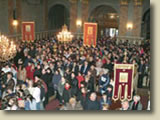 On
behalf of the Roman Catholic Church, those present were welcomed
by Archbishop Stanislav Hocevar of Belgrade, who reminded that
every life is a calling and if we are in peace in Christ, then
we are called upon to build peace in the world. On
behalf of the Roman Catholic Church, those present were welcomed
by Archbishop Stanislav Hocevar of Belgrade, who reminded that
every life is a calling and if we are in peace in Christ, then
we are called upon to build peace in the world.
Participants
in the conference were then greeted by the bishops of the Reform
Churches, the ministers of the Republic of Serbia, Milan Radulovic
and Dr. Bojan Dimitrijevic, Nicholas Hercules, representative
of the United Nations Development Programme, and Eduard Hofman,
European Union expert for social and economic issues.
WORKING
PART OF THE CONFERENCE IN BECEJ
Before the
beginning of the working part, morning prayers were served in
the Orthodox church of the Holy Great-Martyr George in Becej.
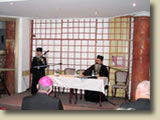 His
Grace Bishop Irinej of Backa presided over the introductory plenary
session in the Bela Ladja Hotel. First Becej mayor Djordje Predin
and the municipal assembly president Pal Sandor welcomed the Conference.
His Holiness Patriarch Pavle and Metropolitan Emmanuel then spoke
about the significance of the Conference, the latter conveying
the message of Ecumenical Patriarch Bartholomew emphasizing that
“we can only build Europe by a path of peace and reconciliation”.
“We can achieve this with the help of political and spiritual
leaders,” Metropolitan Emmanuel emphasized the role of the media
in presenting information about multicultural and multiconfessional
Europe. “We cannot enter the Europe of the future without Serbia,”
said the Metropolitan, reminding that Southeast Europe should
be a model of coexistence with other religious communities and
peoples. His
Grace Bishop Irinej of Backa presided over the introductory plenary
session in the Bela Ladja Hotel. First Becej mayor Djordje Predin
and the municipal assembly president Pal Sandor welcomed the Conference.
His Holiness Patriarch Pavle and Metropolitan Emmanuel then spoke
about the significance of the Conference, the latter conveying
the message of Ecumenical Patriarch Bartholomew emphasizing that
“we can only build Europe by a path of peace and reconciliation”.
“We can achieve this with the help of political and spiritual
leaders,” Metropolitan Emmanuel emphasized the role of the media
in presenting information about multicultural and multiconfessional
Europe. “We cannot enter the Europe of the future without Serbia,”
said the Metropolitan, reminding that Southeast Europe should
be a model of coexistence with other religious communities and
peoples.
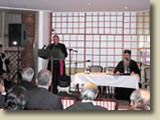 The
plenary session continued with the presentation of Archbishop
Stanislav Hocevar, who reminded of the Encyclical of His Holiness
John Paul II where it is said “the Christian faith is a calling
of its Creator but also of the time in which we live”. “Our calling
is to make it possible for one another to live in accordance with
the law of faith urging us to peace and community”. The
plenary session continued with the presentation of Archbishop
Stanislav Hocevar, who reminded of the Encyclical of His Holiness
John Paul II where it is said “the Christian faith is a calling
of its Creator but also of the time in which we live”. “Our calling
is to make it possible for one another to live in accordance with
the law of faith urging us to peace and community”.
Bishop Irinej
then explained the significance of these messages, reminding of
the initiative of the Ecumenical Patriarchate and the Roman Catholic
Church calling for dialogue between fraternal Christian churches.
Bishop Irinej added that “the Christian Churches should be the
carriers of new dialogue and returning the soul of the European
continent”.
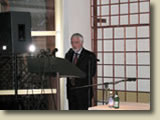 Dr.
Andrija Kopilovic, the Prorector of the Institute of Catechism
and Theology in Subotica, Bishop Porfirije of Jegar, and Serbian
Deputy Prime Minister Miroljub Labus then gave the introductory
presentations. Dr.
Andrija Kopilovic, the Prorector of the Institute of Catechism
and Theology in Subotica, Bishop Porfirije of Jegar, and Serbian
Deputy Prime Minister Miroljub Labus then gave the introductory
presentations.
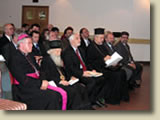 The
work of the Conference continued in work groups on religious cooperation,
cultural cooperation, inter-national cooperation, and European
integration. Moderators included Fr. Andrija Kopilovic, Archimandrite
Andrej (Cilerdzic), Dubravka Valic, and Marija Janjatovic. Each
group included approximately twenty participants, including theologians,
state officials, representatives of national councils, foreign
states and international organizations, and experts provided highly
informative presentations and took part in discussion. The
work of the Conference continued in work groups on religious cooperation,
cultural cooperation, inter-national cooperation, and European
integration. Moderators included Fr. Andrija Kopilovic, Archimandrite
Andrej (Cilerdzic), Dubravka Valic, and Marija Janjatovic. Each
group included approximately twenty participants, including theologians,
state officials, representatives of national councils, foreign
states and international organizations, and experts provided highly
informative presentations and took part in discussion.
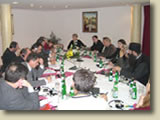 On
Wednesday, November 24, 2004, the concluding plenary session began
with presentations on the work of all the groups. Serbian prime
minister Vojislav Kostunica joined the Conference at this time,
who addressed the plenum and emphasized that the time has come
for the Churches to independently express their understanding
of their own role in society, and that the period when religion
was marginalized is now over. On
Wednesday, November 24, 2004, the concluding plenary session began
with presentations on the work of all the groups. Serbian prime
minister Vojislav Kostunica joined the Conference at this time,
who addressed the plenum and emphasized that the time has come
for the Churches to independently express their understanding
of their own role in society, and that the period when religion
was marginalized is now over.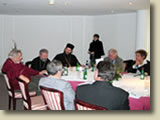 Where religion is not free, neither are the people. Serbia is
vitally interested in freeing the Churches and religious communities
of their inherited ideological tutelage and political manipulations
as in the case of Kosovo and Metohija. Emphasizing the importance
of a pan-Christian meeting for the process of European integration,
Prime Minister Kostunica concluded that the religious structure
of Serbia is already completely European. The Church is aware
of its role and future accountability in the building of a modern
Christian society as witnessed by this Conference. Dr. Kostunica
sincerely thanked the organizers for their efforts and goodwill
in making a contribution in these difficult times because the
role of the Church in democratization and harmonization processes
in society is incontestable. The government has decided to establish
free, full and effective cooperation with the Churches and religious
communities.
Where religion is not free, neither are the people. Serbia is
vitally interested in freeing the Churches and religious communities
of their inherited ideological tutelage and political manipulations
as in the case of Kosovo and Metohija. Emphasizing the importance
of a pan-Christian meeting for the process of European integration,
Prime Minister Kostunica concluded that the religious structure
of Serbia is already completely European. The Church is aware
of its role and future accountability in the building of a modern
Christian society as witnessed by this Conference. Dr. Kostunica
sincerely thanked the organizers for their efforts and goodwill
in making a contribution in these difficult times because the
role of the Church in democratization and harmonization processes
in society is incontestable. The government has decided to establish
free, full and effective cooperation with the Churches and religious
communities.
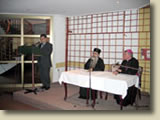 The
first version of the Conference Message was then read. The
first version of the Conference Message was then read.
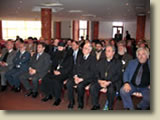 Participants
of the Conference enriched the content of the Message with their
suggestions and it was then unanimously adopted. Bishop Irinej
and Roman Catholic Archbishop Hocevar signed the Message before
participants and numerous reporters. Participants
of the Conference enriched the content of the Message with their
suggestions and it was then unanimously adopted. Bishop Irinej
and Roman Catholic Archbishop Hocevar signed the Message before
participants and numerous reporters.
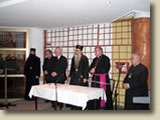 Fr.
Andrija Kopilovic then directed a press conference with Serbian
Prime Minister Vojislav Kostunica, Bishop Irinej and Roman Catholic
Archbishop Stanislav Hocevar among the speakers. Numerous representatives
of local media from Vojvodina and correspondents and special reporters
of daily newspapers and news agencies from throughout Serbia attended
the conference. Fr.
Andrija Kopilovic then directed a press conference with Serbian
Prime Minister Vojislav Kostunica, Bishop Irinej and Roman Catholic
Archbishop Stanislav Hocevar among the speakers. Numerous representatives
of local media from Vojvodina and correspondents and special reporters
of daily newspapers and news agencies from throughout Serbia attended
the conference.
By
Gordana Gutovic

JESUS
CHRIST IN THE DARKNESS OF HISTORICAL CRITICISM
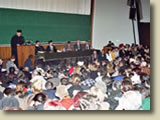 On
Thursday, November 25, 2004 in the amphitheatre of the Faculty
of Machine Engineering, the editors of the Serbian Patriarchate’s
publication “Pravoslavlje” and Udruzenje Srpski Sabor Dveri organized
a public forum on the theme of “Jesus Christ in the Darkness of
Historical Criticism” following the publication of Predrag Samardzic’s
new book by that title. On
Thursday, November 25, 2004 in the amphitheatre of the Faculty
of Machine Engineering, the editors of the Serbian Patriarchate’s
publication “Pravoslavlje” and Udruzenje Srpski Sabor Dveri organized
a public forum on the theme of “Jesus Christ in the Darkness of
Historical Criticism” following the publication of Predrag Samardzic’s
new book by that title.
Speakers
included His Grace Bishop Irinej of Backa, His Grace Bishop Atanasije
of Zahumlje and Herzegovina (retired), and Protodeacon Rados Mladenovic.
 The
forum was opened before a crowded amphitheatre by the dean of
the Faculty of Machine Engineering of the University in Belgrade,
Dr. Milos Nedeljkovic, who welcomed all present, especially the
lecturers and eminent guests, including Serbian energy minister
Radomir Naumov and deputy minister for culture and media Miroljub
Radosavljevic. The
forum was opened before a crowded amphitheatre by the dean of
the Faculty of Machine Engineering of the University in Belgrade,
Dr. Milos Nedeljkovic, who welcomed all present, especially the
lecturers and eminent guests, including Serbian energy minister
Radomir Naumov and deputy minister for culture and media Miroljub
Radosavljevic.
The
first speaker was Bishop Irinej who briefly and succinctly described
the purpose for the writing of Predrag Samardzic’s book. He defined
the problem as one that has already existed for two thousand years
and can be reduced to atheist attacks on Christ and Christians.
The book Predrag Samardzic responded to in writing his book is
Milan Vukmanovic’s “Early Christianity: From Jesus to Christ”
in which the author attempts to analyze the early Church in an
uncritical and pseudoscientific manner. Unlike Vukomanovic, Samardzic
writes from a historical and Biblical critical perspective that
does not interrupt the ecclesiastical and traditional context
of the Holy Scripture. Samardzic’s tone is neither argumentative
nor ideological but full of love and understanding. At the end
of his inspirational presentation, Bishop Irinej emphasized that
this book will not be forgotten anytime soon because of its valuable
theological content.
The
next speaker about Samardzic’s book was Protodeacon Rados Mladenovic,
who emphasized that this book, by its systematic organization
and mild evangelical expression, has outshined the book that inspired
it. The theme of Vukomanovic’s book is nothing new but borrowed
from the Protestant theologians, especially Bultman. What bother
Vukomanovic and other sociologists of religion is the fact that
Orthodox consciousness is liturgical and eucharistic, not political.
Protodeacon Rados observed that Vukomanovic does not cite a single
Orthodox biblical scholar, and approaches Greek and Latin sources
without a critical spirit. On the other hand, Samardzic very clearly
and rationally presents his criticisms of Vukomanovic’s book and
transcends everything written.
The
key speaker at the public forum and also the writer of the foreword
to Samardzic’s book, His Grace Bishop Atanasije of Zahumlje and
Herzegovina (retired) immediately emphasized that Dr. Milan Vukmanovic’s
book is written in the Roman alphabet [instead of Cyrillic] and
uses what is for Serbs a noticeably foreign terminology. Bishop
Atanasije cited the use of “Hrist” instead of “Hristos” (Christ),
“Trojstvo” instead of “Sveta Trojica” (Holy Trinity), “sakrament”
instead of “Sveta Tajna” (Holy Mystery), “Eusebije” instead of
“Evsevije” (Eusebios), “monasticizam” instead of “monastvo” (monkhood),
etc. Samardzic’s work is a book response to a book but is more
profound than the book that inspired its writing. Bishop Atanasije
compared this modern instance with one from the late third century
when the great ascetic and theologian Origenes wrote a book response
to a book by the philosopher Celsus (Contra Celsum) also more
systematic and profound than its inspiration. The author of the
book “From Jesus to Christ” has an unprofessional attitude toward
the Church and the Holy Scripture, and consequently toward the
very theme he elaborates in his book. This book and others like
it whose content is directed to attack Christ and Christians are
just the tendency of the tempter in the Garden of Eden. Predrag
Samardzic’s “Jesus Christ in the Darkness of Historical Criticism”
exudes an intelligent and scientific expression, criticizes superficiality
and unprofessionalism, and, most importantly of all, is witness
to living faith in the Resurrected Christ.

HELP
THE CHURCH OF THE HOLY TRANSFIGURATION IN ZABARI
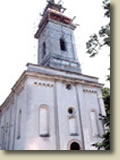 The
church of the Holy Transfiguration in Zabari was consecrated in
1862 and is believed to have been built during the reign of Prince
Milos Obrenovic. Prince Milos gathered his serfs from Arandjelovac,
Gornji Milanovac and Zabari, and explained that his wish was for
the largest church to be built in Arandjelovac, and two other
identical churches to be built in Gornji Milanovac and Zabari. The
church of the Holy Transfiguration in Zabari was consecrated in
1862 and is believed to have been built during the reign of Prince
Milos Obrenovic. Prince Milos gathered his serfs from Arandjelovac,
Gornji Milanovac and Zabari, and explained that his wish was for
the largest church to be built in Arandjelovac, and two other
identical churches to be built in Gornji Milanovac and Zabari.
 The
church in Zabari has a surface area of 408 square meters and stands
39.4 meters n height. It is one of the largest village churches
in the Diocese of Sumadija, drawing the attention of passersby
by its size and especially its height. The iconostasis is the
work of Stevan Todorovic and his students from 1862. The
church in Zabari has a surface area of 408 square meters and stands
39.4 meters n height. It is one of the largest village churches
in the Diocese of Sumadija, drawing the attention of passersby
by its size and especially its height. The iconostasis is the
work of Stevan Todorovic and his students from 1862.
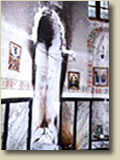 The
church has been placed on the list of historical buildings as
an important architectural achievement of the 19th century and
therefore certain repairs are necessary as per decree number 189
of the Institute for the Protection of Cultural Monuments in Kragujevac
issued April 26, 2004. The
church has been placed on the list of historical buildings as
an important architectural achievement of the 19th century and
therefore certain repairs are necessary as per decree number 189
of the Institute for the Protection of Cultural Monuments in Kragujevac
issued April 26, 2004.
 We
appeal to all those who are able and willing to help us in realizing
this project. No donation is too small, regardless of its material
value, as long as it is from the heart and given in kindness and
love. By making a donation in this spirit, you can help us and
yourselves: you can help us to repair the chair from fire damage
and to grow spiritually and morally even better, and you can help
yourselves and your souls by finding your place before God and
demonstrating by your deed the greatness of your soul and the
kindness of your heart. We
appeal to all those who are able and willing to help us in realizing
this project. No donation is too small, regardless of its material
value, as long as it is from the heart and given in kindness and
love. By making a donation in this spirit, you can help us and
yourselves: you can help us to repair the chair from fire damage
and to grow spiritually and morally even better, and you can help
yourselves and your souls by finding your place before God and
demonstrating by your deed the greatness of your soul and the
kindness of your heart.
Church
elder
Tihomir Andjelkovic
Donations
in dinars may be made account number: 150-10306-66.
CREDY
BANKA AD Kragujevac
Topola branch
34310 Topola
Foreign
donors are kindly asked to contact the
SPC Info Service

[Serbian
Translation Services]
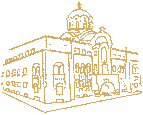
Copyright © 1999-2004 by
The Information Service of
the Serbian Orthodox Church
11000 Belgrade
Kralja Petra I no.5
+381 11 3282 596
e-mail
|

